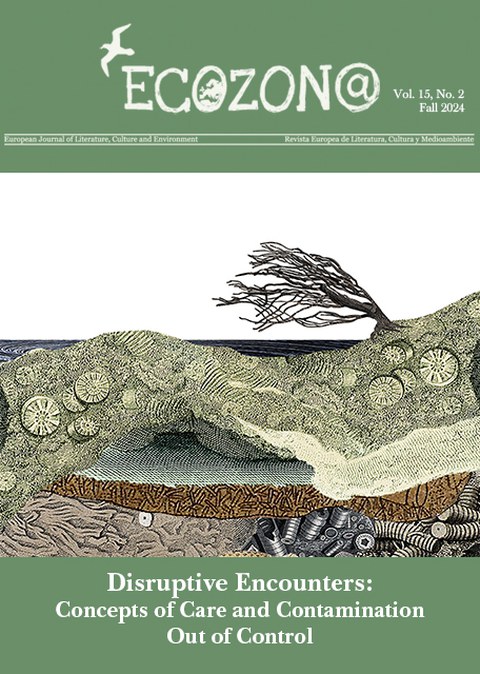07.11.2024
Special Issue “Disruptive Encounters,” Ecozon@ vol. 15., no. 2 (2024), co-edited by Solvejg Nitzke and Svenja Engelmann-Kewitz
The Special Issue “Disruptive Encounters. Concepts of Care and Contamination out of Control”, co-edited by Solvejg Nitzke and Svenja Engelmann-Kewitz with help from Kirsten Jüdt, looks at three major sites of disruptive encounters that engender practices of care, contamination and surrendering control over (nonhuman) environments: “Science-Art-Worldings” for critical zones of multispecies thinking (cf. Donna Haraway), “Forced Nurture” for investigating encounters from within (cf. Anna Tsing), and “Gentle Collisions” describing matters of care beyond logics of dominance (cf. María Puig de la Bellacasa).
While all of these sites dismantle, deconstruct and overcome boundaries, the contributions in the issue urge to pause for reflection here. Taking into account the hype surrounding the subversion of boundaries, the contributions put asymmetrical power relations between humans and nonhumans to the forefront. Humans (especially those who govern, interpret, direct and conduct power) shape and design these asymmetrical power relations in the first place, making humans not just observers but participants with varying accountability for the impacts of the encounter. Investigating this accountability is the connecting theme in the 9 articles of the special issue selected by the editors.
The articles read the Arctic as Commons (Alina Stefan/Sieglinde Grimm), propose the idea of a Coastal World Literature to understand opposing perspectives alongside the shores and beaches of Northern Europe (Karl Rosenbæk Reetz) and consider the ambivalent entanglements of humans and Icelandic horses (Judith Meurer-Bongardt). They look for rogue whale encounters in the Mediterranean Sea (Taylin Nelson) and read the colonial blending of human and animal form in German publications about Rwanda in relation to colonial legacies and the Tutsi genocide (Anne Peiter). They read the forest as a site for not just recovery, restoration and recharge, but also respite (Helga Braunbeck) or look at trees and humans from arbocentric perspectives (Alisa Kronberger). They investigate encounters between AI, robotic humanoids and the ideas of care (Giulia Baquè) and read ghostly encounters of the New Weird through a lens of disruptivity (Elisa Mazzocato).
The issue thus spans various climates and geographical locations, historical dimensions and languages, media and disciplines. Thereby, the contributions in the issue show how disruptive encounters combine and recombine sites of encounter as complex constellations in need of careful observation and participation to evaluate their impact and sustainability.
It is accessible here: https://ecozona.eu/issue/view/277

